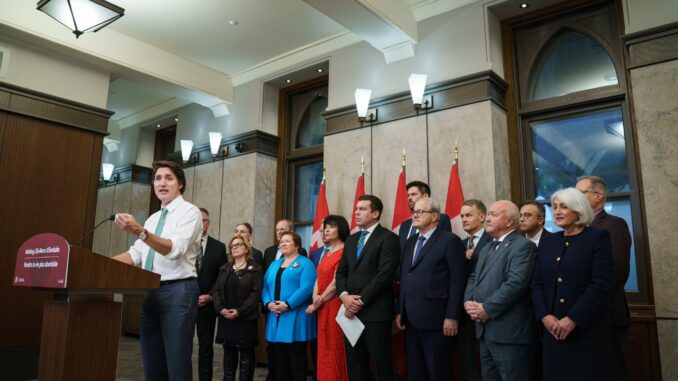
As global market forces and inflation continue to hit Canadians, too many families are feeling the pressure on their monthly bills. Already, the Government of Canada has taken action on affordable child care, home retrofits, grocery prices, and more. And we are now taking an ambitious next step with a new energy affordability package.
The Prime Minister, Justin Trudeau, on Thursday announced the government is moving ahead with doubling the pollution price rebate (Climate Action Incentive Payment) rural top-up rate, increasing it from 10 to 20 per cent of the baseline amount starting in April 2024. People who live in rural communities face unique realities, and this measure will help put even more money back in the pockets of families dealing with higher energy costs because they live outside a large city.
We’re doubling the rural-top up on the pollution price rebate, temporarily pausing the federal price on pollution for heating oil, and helping Atlantic Canadians switch to an electric heat pump. More on how we’re delivering support on your energy bills: https://t.co/Rh9PENQon0 pic.twitter.com/sSgQhavz3J
— Justin Trudeau (@JustinTrudeau) October 26, 2023
Given the pressures faced by households and small businesses that use oil heating, the Prime Minister also announced that the government is moving ahead with a temporary, three-year pause to the federal price on pollution (fuel charge) on deliveries of heating oil in all jurisdictions where the federal fuel charge is in effect. This pause would begin 14 days from today. While the fuel charge is already returned to consumers through the pollution price rebate, this temporary pause would save a household that uses heating oil $250 at the current rate, on average, while the federal government works with provinces to roll out heat pumps and phase out oil for heating over the longer term.
Additionally, the federal government will work with provinces and territories to help people save money over the longer term by making it easier to switch to an electric heat pump to heat their homes. The Prime Minister announced the following new measures that will be piloted first in Atlantic Canada:
- An upfront payment of $250 for low- to median-income households, which will be available to those who heat their homes with oil and sign up for a heat pump through a joint federal-provincial government program.
- A strengthened Oil to Heat Pump Affordability program that will partner with provinces and territories to increase from $10,000 to $15,000 the amount of federal funding eligible homeowners can receive for installing a heat pump, adding up to an additional $5,000 in grant funding to match provincial and territorial contributions via co-delivery arrangements. This would make the average heat pump free for lower income households as we continue to minimize upfront costs and make federal programs even easier to access for all households.
On average, homeowners who switch from oil to cold-climate heat pumps to heat and cool their homes save up to $2,500 per year on home energy bills.
Families are feeling the pressure on monthly bills. This new energy affordability package, along with the work the federal government is doing on everything from child care to housing, will get people the support they need and deserve.
Quote
“Today’s announcement is good news for Atlantic Canadians, rural Canadians, and people across the country. We are putting more money back in your pocket and making it easier for you to find affordable, long-term solutions to heat your home. These measures will help make a real difference.”
Quick Facts
- The pollution price rebate (Climate Action Incentive Payment or CAIP) is how the proceeds of pollution pricing are returned directly to families in provinces where the federal system applies. The quarterly CAIP currently includes a 10 per cent top-up for residents of small and rural communities, which, per today’s announcement, would be increased to 20 per cent as of April 2024.
- The federal fuel charge is implemented by the Government of Canada in provinces and territories that request it or that do not have a carbon pricing system that meets the federal benchmark. All direct proceeds from the fuel charge are returned to the jurisdiction where they were collected. Through the pollution price rebate, eight out of 10 families in backstop provinces receive more money back than they pay into the system.
- The temporary fuel charge pause for deliveries of light fuel oil for use exclusively to provide heat to a home or building would be provided for the next three fuel charge years in the jurisdictions where the federal fuel charge applies (Alberta, Manitoba, New Brunswick, Newfoundland and Labrador, Nova Scotia, Nunavut, Ontario, Prince Edward Island, Saskatchewan, and the Yukon), up to March 31, 2027. The fuel charge would apply again to these deliveries as of April 1, 2027.
- Heat pumps are one of the best ways for homeowners to get off heating oil – saving money on energy bills and fighting climate change in the process. When compared with other electric home heating sources, they are also two to three times more efficient.
- Introduced in 2022, the Oil to Heat Pump Affordability program helps low- to median-income households that are currently heating their homes with oil to move to electric heat pumps. By switching, homeowners can receive funding toward the purchase and installation of a new, cold-climate heat pump, save thousands of dollars annually on heating bills, and help cut pollution.
SOURCE PMO

Leave a Reply